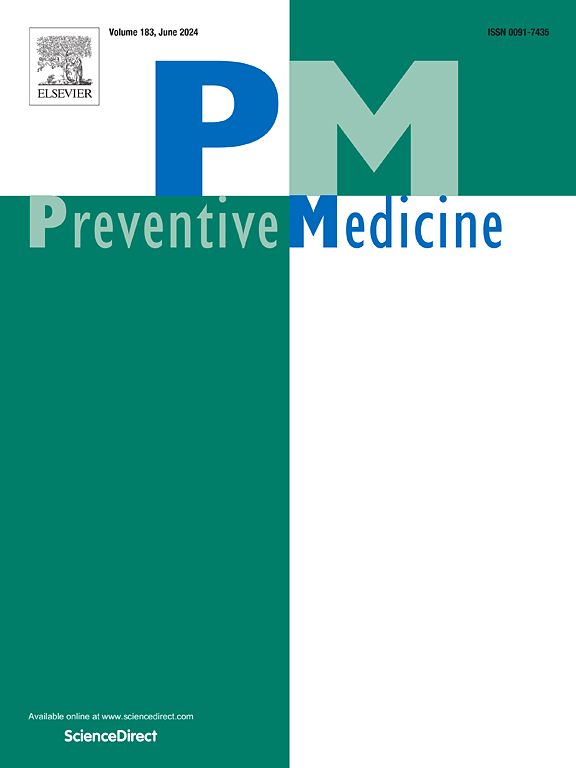坚持推荐的基于血液的癌症和慢性疾病筛查试验:系统的文献综述。
IF 3.2
2区 医学
Q1 MEDICINE, GENERAL & INTERNAL
引用次数: 0
摘要
简介:血液检测是癌症和其他慢性疾病早期发现和管理的一个令人信服的选择。虽然它们可能会增加患者的参与度,但关于临床实践中更大依从性的假设需要进一步评估。本系统综述旨在评估现实世界中对常用推荐筛查指征的既定血液检测的依从性,以告知平均风险结直肠癌(CRC)筛查的期望。方法:对PubMed、Embase和引文进行全面系统的检索,确定2010 - 2023年发表的文献。纳入的研究检查了美国预防服务工作组(USPSTF)对2型糖尿病、血脂异常、丙型肝炎病毒(HCV)和人类免疫缺陷病毒(HIV)的A/B级血液检查建议的依从性。前列腺特异性抗原(PSA)检测对前列腺癌筛查的依从性(USPSTF推荐C级),是唯一广泛适用于平均风险成人的基于血液的单一癌症筛查试验,也包括在内。没有静脉穿刺血液的研究被排除在外。结果:53067篇文献中,69篇被纳入。血液筛查试验的依从率变化很大,糖尿病、血脂异常、HCV和HIV的中位值和四分位数范围(IQR)分别为66.3% %(59.2-71.1)、67.8% %(54.4-72.4)、34% %(21.9-50.5)和36.8% %(29.1-59.1)。PSA检测依从性为37.2% %(30- 48.5%)。信息偏倚和选择偏倚是常见的偏倚风险。结论:现实世界中对推荐的血液筛查的依从性是次优的。未来的研究需要确定这些发现是否可以推广到基于血液的CRC筛查,并评估这种策略如何影响临床、经济和健康公平结果。本文章由计算机程序翻译,如有差异,请以英文原文为准。
Adherence to recommended blood-based screening tests for cancer and chronic diseases: A systematic literature review
Introduction
Blood-based tests represent a compelling option for early detection and management of cancers and other chronic diseases. While they may increase patient engagement, assumptions about greater adherence in clinical practice need further evaluation. This systematic review aimed to evaluate real-world adherence to established blood-based tests for commonly recommended screening indications to inform expectations for average-risk colorectal cancer (CRC) screening.
Methods
A comprehensive and systematic search of PubMed, Embase, and citations was conducted to identify literature published from 2010 to 2023. Included studies examined adherence to United States Preventive Services Task Force (USPSTF) grade A/B blood test recommendations for type 2 diabetes, dyslipidemia, hepatitis C virus (HCV), and human immunodeficiency virus (HIV). Prostate-specific antigen (PSA) testing adherence for prostate cancer screening (grade C USPSTF recommendation), the only widely accessible blood-based single-cancer screening test for average-risk adults, was also included. Studies without venipuncture-derived blood were excluded.
Results
Of 53,067 articles, 69 were included. Adherence rates of blood-based screening tests were highly variable, with median values and interquartile range (IQR) of 66.3 % (59.2–71.1), 67.8 % (54.4–72.4), 34 % (21.9–50.5), and 36.8 % (29.1–59.1) for diabetes, dyslipidemia, HCV, and HIV, respectively. PSA testing adherence was 37.2 % (30–48.5). Information and selection bias were common risks of bias.
Conclusions
Real-world adherence to recommended blood-based screening is suboptimal. Future research is needed to determine whether these findings are generalizable to blood-based CRC screening and to assess how such a strategy could impact clinical, economic, and health equity outcomes.
求助全文
通过发布文献求助,成功后即可免费获取论文全文。
去求助
来源期刊

Preventive medicine
医学-公共卫生、环境卫生与职业卫生
CiteScore
7.70
自引率
3.90%
发文量
0
审稿时长
42 days
期刊介绍:
Founded in 1972 by Ernst Wynder, Preventive Medicine is an international scholarly journal that provides prompt publication of original articles on the science and practice of disease prevention, health promotion, and public health policymaking. Preventive Medicine aims to reward innovation. It will favor insightful observational studies, thoughtful explorations of health data, unsuspected new angles for existing hypotheses, robust randomized controlled trials, and impartial systematic reviews. Preventive Medicine''s ultimate goal is to publish research that will have an impact on the work of practitioners of disease prevention and health promotion, as well as of related disciplines.
 求助内容:
求助内容: 应助结果提醒方式:
应助结果提醒方式:


